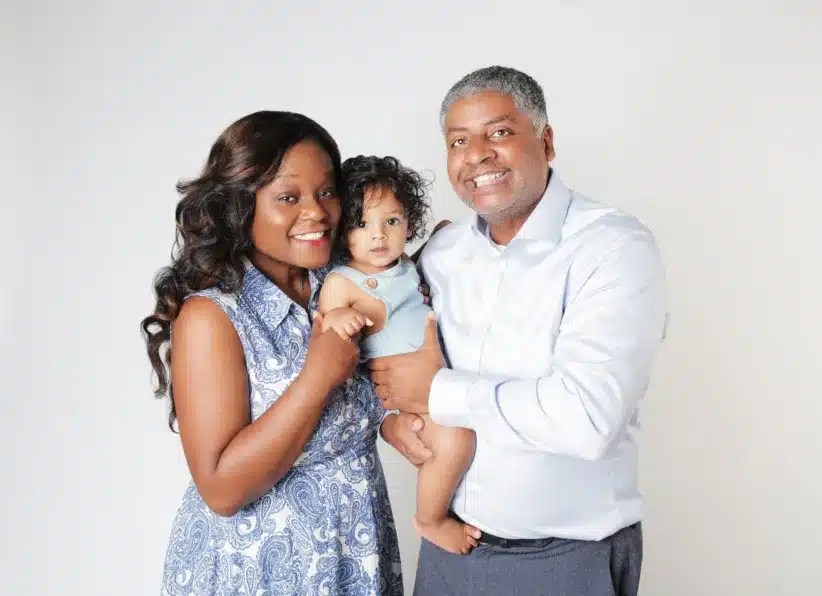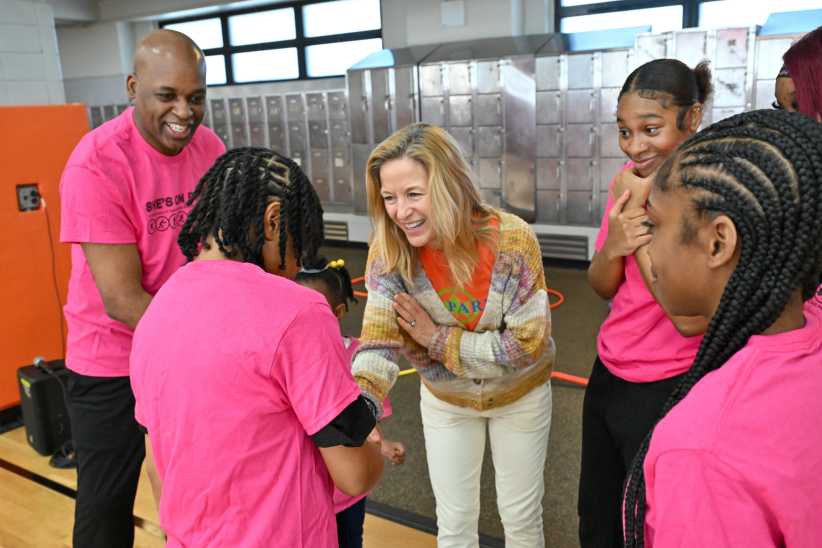
Assembly Member Rodneyse Bichotte Hermelyn on Black Maternal Health, entering Politics and Raising her Toddler
On a cozy cover shoot day at The Soft Space by Mama Glow in Brooklyn, the New York Family team and our cover mom relished in the light that danced into this gorgeous space while enjoying music, chatter, and staying out of the way of an active 17-month-old toddler running about while nibbling on his lunch.
Our focus this day was on his incredible mother, Rodneyse Bichotte Hermelyn. Rodneyse serves as the Assemblywoman for New York State’s 42nd Assembly District, which encompasses Flatbush, East Flatbush, Midwood, and Ditmas Park in Brooklyn. She is also the Brooklyn Democratic Chair, making her the first woman and first Black woman to hold this position. She is also the first Haitian American woman elected in NYC.
Yes, she is as impressive as she sounds. While Rodneyse diligently serves her community as their representative, she also focuses on a cause dear to her heart—advocating for Maternal Health and combatting the maternal health crisis that is adversely affecting minorities.
Psst…BookTok: What Parents Need to Know About What Their Kids are Reading
For Black women especially, pregnancy and labor can be dangerous. According to ny.gov.com the United States is one of the only countries in the world that has seen a rise in maternal mortality rate since 2000, and Black birthing people in the U.S. die at more than double the rate of Caucasian birthing people. According to a 2021 CDC report, the Maternal Mortality Rate in the United States non-Hispanic Black (subsequently, Black) women was 69.9 deaths per 100,000 live births, 2.6 times the rate for non-Hispanic White (subsequently, White) women (26.6) Rates for Black women were significantly higher than rates for White and Hispanic women.
About eight years ago, Rodneyse experienced a pre-term pregnancy loss. Although the loss came down to many factors, the key one was that maternal healthcare, healthcare transparency, and access to providers who put both mothers and their babies first was severely lacking.
Rodneyse was high-risk and had several complications, some of which were not detected or not properly communicated, leading to her being rushed to a Manhattan hospital where she was told the only solution was to terminate her baby. “I wanted the doctors to do everything they needed to save me and my baby,” she said.
Eventually, Rodneyse delivered her child, Jonah, at another hospital, where he lived for less than two hours. “It was probably the saddest day of my life,” she explained. “That’s when I decided to focus on maternal healthcare bills.”
And she did. Rodneyse drove the “Jonah Bichotte Cowan Law” in her son’s name, which establishes requirements for treatment when an expecting mother comes to a hospital with concerns about pre-term labor.
Now, after a healthy and safe pregnancy, Rodneyse and her husband, Edu, are parents to beautiful 18-month-old Daniel. From introducing new laws to opening the Morris Heights Health Center’s (MHHC) state-of-the-art women’s clinic and maternal health center, Rodneyse continues to advocate for maternal healthcare and more. And she does all of this while studying for a law degree!
Read on to learn about Rodneyse’s creative career journey, raising her son, childcare when legislating, a supportive husband, and more.

NYF: Before entering public service, you were a public school teacher, an engineer, and an investment banker. What made you decide to enter politics?
RBH: Joining then US Senate candidate Barack Obama’s campaign in Illinois in 2004 was my first taste of local politics. As an Obama Operative, I rallied Democrats while finishing up my MBA at Northwestern and working full-time at Lucent Technologies as an engineer. Shortly after having moved back to New York City in 2005 and having worked as an investment Banker on Wall Street at the height of the Financial Crisis, I took a turn in a different direction after being reintroduced to local politics and reigniting my desire to uplift communities.
This time, it was in my hometown of Brooklyn, helping a state senator Kevin Parker in 2008. After being laid off, I had an epiphany and decided it was my calling to serve as a voice for my community. It was the teacher in me that understood the need for building our public school system; it was the engineer in me that wanted to push STEM programs for city school students while encouraging minority and women-owned business opportunities, it was my ability to work with numbers that helped my data analytics in assessing my run for office.
NYF: You recently took the bar exam; what is the commitment to using your legal education in your work?
RBH: My constant learning throughout my career allowed me to be a better legislator and understand and address pressing, complex issues.
Law School was a massive undertaking, but I am committed to serving vulnerable and protected classes of people in the courtroom, especially as it relates to Civil Rights, constitutional law and immigration law. I am interested in using my engineering background in construction law as well. I also want to be a better legislator in the way I write bills and debate them on the floor. And as Assembly Majority Whip, I have a responsibility to ensure bills get passed through.
After losing my son and having been mistreated by the hospital, I decided that a legal education would allow me to advocate for many in the courtroom.
NYF: Can you explain the “Jonah Bichotte Cowan Law” and the protections it provides for the expecting mother at the hospital?
RBH: It provides protection and rights for all expectant mothers in New York to have their medical concerns taken seriously and the hospital of their choice to admit, diagnose, and treat expectant mothers in emergency situations.
More specifically, it establishes requirements for treatment when an expectant mother presents at a general hospital with concerns about being in preterm labor. This law ensures that, first, mothers are informed that they are going into early labor and of the associated risks, and secondly: these hospitals must care for high-risk pregnancies.
The law is named in memory of my late son Jonah Bichotte Cowan, who passed after I was turned away from a hospital I rushed to in early labor. After discovering I was dilating at 3cm, I was notified of the worst news an expectant mother can receive – both me and my unborn baby were in an incredibly fatal and high-risk situation. Knowing the risks associated, the Doctors at one Hospital discharged and forcefully released me, citing “hospital policy.”
I was then rushed to another hospital in Brooklyn. They took me in, and their doctors were culturally competent. They understood my situation and tried their best to help. Although they were not able to save Jonah, the stark difference between their care and how I was denied treatment at a well-regarded corporate hospital highlighted the need for legislative action.
One in 10 families across the country faces the same unfortunate narrative of a high-risk pregnancy and mistreatment at the hands of medical professionals, and now it’s prevented through law in New York.
NYF: Does the mother have to mention this law, or should it be something that all medical staff are aware of?
RBH: This is a critical healthcare right that all medical staff should be aware of. Unfortunately, issues in our healthcare system still exist, so I encourage expectant mothers to be aware of all their rights.
NYF: You opened up a health clinic. Can you share it? Where is this located, and what support can a mother find?
RBH: Of course! The Morris Heights Health Center’s (MHHC) new health facility, located at One Brooklyn, 1095 Flatbush Avenue, has a state-of-the-art Maternal Health Center of Excellence. The women’s clinic and maternal health center provide much-needed high-quality services through culturally competent doctors.
Central Brooklyn was lacking the proper maternal care needed for our communities facing a maternal health crisis, and I am honored to have secured funding for MHHC through the Vital Brooklyn Initiative.

NYF: You are no doubt super busy. How are you ‘juggling’ a toddler and career? What does your support system look like?
To say I’m busy is an understatement! I’m fortunate to have a great support system–my super-supportive husband (who also works) and a nanny help balance childcare when I’m in my District in Brooklyn. Up in Albany, the Assembly is full of new moms in office, and Assembly Speaker Carl Heastie has been immensely helpful in providing childcare resources when we’re legislating.
I know that it’s incredibly tough out there for many moms who lack these resources, and are trying to hold down a job while struggling to afford help. I am always advocating to make childcare more accessible, including co-sponsoring the “universal child care act” which would make free childcare accessible for all New Yorkers
NYF: Lastly, let’s talk about your adorable 18-month-old Daniel. How’s the experience of being a mom?
RBH: The experience of being a mom is unmatched. I am filled with joy and gratitude every day when I wake up to see my little boy growing healthy and very happy. I am also blessed to have avoided complications during birth and post-postpartum depression. I thank God for my health, my cherished son’s health and my husband’s.
What should a minority mother should know to protect herself and her family at the hospital?
Be proactive by pursuing a comprehensive plan before common complications might occur (especially with diabetes and other issues disproportionately affecting Black women), be monitoring your body and health, such as your cervix and for preeclampsia.
It’s important to bring up any issues you’re experiencing with your doctor, and make sure they are listening and taking them seriously.
Mothers should know their rights and that the hospital is required to service them. They need to consent to all procedures like C-sections and uterus removal; they should have a doula and a close person to speak on their behalf when they are feeling pain, or bleeding or experiencing any issue. They should know their rights on the risk of the baby; they should know of the prenatal services as well as post-natal service and care they have a right to receive.
For those who can’t afford some of these services, The New Family Home Visits Initiative offers support, services, and referrals to new and expectant parents, including no-cost doulas for those who qualify.
Helpful to New York Mothers
Both Mayor Adams and Governor Hochul have recently taken significant steps to reduce maternal and infant health inequities in New York City and the State by providing critical resources to new families.
Mayor Adams announced a citywide expansion of the doula program, the expansion of a Midwifery Initiative, and the expansion of a maternal health care services program.
Gov. Hochul introduced a six-point policy plan (I proudly spoke at her announcement at Wyckoff Hospital, where my son Daniel was born and where I lost Jonah) and legislation to expand access to high-quality prenatal care, reduce costs for mothers and families, fight postpartum depression and support infants in the first months of their lives.






















